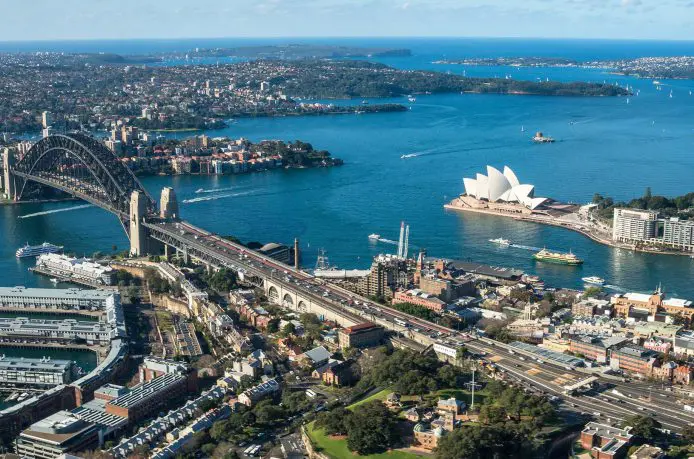A Resilient City is one with the individual, community, business and structural capacity to successfully respond to big assaults such as heat, fires and floods, but also to the stresses that weaken the fabric of a city on a day-to-day or cyclical basis.
Resilient Sydney was initially established in 2015, with support from the 100 Resilient Cities initiative pioneered by the Rockefeller Foundation, to help more cities build resilience to the physical, social, and economic challenges of the 21st century. These include rapid population growth, increasing social inequality and unemployment, climate change and increasing pressures on our natural assets, and escalating rates of alcoholism and family violence. We can now add a global pandemic to this list.
Resilient Sydney is a local government-led program hosted by the City of Sydney on behalf of all 33 metropolitan councils of Sydney. Over three years, leaders from government, academic, infrastructure, emergency management, environment, community and health sectors worked together with more than 1,000 residents to identify issues that impact Sydney’s resilience, both now and in the future.
The Strategy delivers five directions and 35 tangible actions Sydney can take to build resilience and strengthen the city’s ability to survive, adapt and thrive in the face of global uncertainty and local shocks and chronic stresses.
Direction 1: People-centred
To be resilient, communities must be included in the decision making that shapes their lives. Local councils must address community stresses while ensuring infrastructure and services meet local needs.
Direction 2: Live with our climate
We must cool our suburbs susceptible to the impacts of extreme heat. By using the latest in data sensing the built environment can be monitored and initiatives introduced to reduce temperatures, improve canopy cover, decrease morbidity and mortality, and reduce the economic impacts of extreme heat.
Direction 3: Connect for strength
Communities in Sydney are diverse and cohesive but intolerance and inequity are rising. To be resilient every Sydneysider needs a sense of belonging and equal access through a coordinated approach to connect government, business, academia, social services and communities and enhance social cohesion and wellbeing.
Direction 4: Get ready
Like other cities, Sydney relies on networks of infrastructure and essential services to provide food, energy, water, transport and waste management. The Red Cross and IAG have developed a free app called Get Prepared to help communities prepare for emergencies.
Resilient Sydney will widely promote the app, aiming for 100,000 app downloads by 2022.
Direction 5: One city
Sydney is governed as a metropolis of three cities: the Western Parkland City, the Central River City and the Eastern Harbour City. Cohesive governance makes integrated decisions to build their capacity to understand and manage vulnerabilities, inter-dependencies and risks.
To understand the thinking behind the Resilient City plan we spoke to Independent Councillor and Deputy Chair of the Environment Committee, Jess Miller and Deputy Lord Mayor, Jess Scully, to find out what Resilient Sydney means to them.
Councillor Jess Miller shares her thoughts (after her regular Muay Thai sparring session!):
“The word ‘resilience’ is bandied around so much. You hear it on the news with reference to communities, by fire chiefs about recoveries, to describe people we should look up to and as a parenting ambition.
But what does it really mean?
Sure, there’s a little bit of ’toughness’ to it. There’s also pliability and the ability to react and respond and adapt with ease. But perhaps the best way I’ve heard it described, is ‘the ability to not only bounce back, but bounce forward’. To me this means facing adversity, disruption or stress and emerging from it stronger, smarter, and somehow different and better than you were before.
Becoming a truly resilient city is not something that can be done alone, nor without facing adversity. The past 12 months has tested us. It is entirely likely that the coming 12 months, five and even 10 years will throw up increasing – and likely more intense -challenges.
We will continue to be tested economically, socially, environmentally, and culturally. The strength and integrity of all of the systems working together – a city – will continue to come under increased stress, and the weaknesses will be exposed. We cannot possibly expect to deal with these pressures and stress if we are not willing to acknowledge them, create a plan and work together to overcome them.
In short, it’s not all about ‘us’ as the City of Sydney. Sure, we might be the ones going in to ‘fight’ – but we need other councils, institutions, state government entities and the community in our corner, to help the city – as a complex and co-dependent system – function.
Resilient Sydney and the five key directions, is a plan to help prepare us for whatever is thrown our way in the future. There’s a role for everyone to play – as professionals, businesses, individuals, community members and government – as well as tools to deal with immediate and future threats.
The context for the famous Mike Tyson quote, “Everyone has a plan until they get punched in the mouth”, was in response to journalists asking what would happen in a big fight, ahead of his return from retirement to the ring (in 1997 at age 46). He further explained:
“If you’re good and your plan is working, somewhere doing the duration of that, the event that you’re involved in, you’re going to get the wrath …the bad end of the stick. Let’s see how you deal with it. Normally people don’t deal with it that well.”
As a City we have been very lucky for a long time. Our future resilience will be defined by how we react to adversity, and not the adversity itself. Will we do it with courage, kindness and awareness? Or will we let adversity cause blame, fear and division? I’m realistic about the nature of the threat we’re facing. At the same time, I have confidence in the plan we have. To execute it well requires that we do it together, and this is something we all need to be responsible for.”
Naturally the ability of the local economy to fight back is top of mind.
Councillor Jess Scully has this to say about resilience within the context of local economic recovery from COVID-19:
“Earlier this year I requested that the City of Sydney develop a Community Wealth Building Policy. Prior to that, I asked the City to develop a Local Preference Policy to encourage the development of jobs and retention of wealth within our community.
My intention behind each of these proposals was to recognise the role that the City could play in generating local wealth and supporting sustainable, ethical business models.
I’m proud to report that the City is taking up these principles and is looking at how we will embed them into our work and community relationships.
Throughout the pandemic, the City has worked hard to support our communities. It has been an uncertain and sometimes frightening period and it has lasted longer than most of us expected. Families have suffered, businesses have been devastated and people have experienced disconnectedness as we followed the necessary public health orders to stay home and isolate.
In March and April this year the City of Sydney announced two relief packages to help our community, small business and cultural sectors mitigate the social and economic impacts of Covid-19.
In June this year the City released its Covid-19 Community Recovery Plan. The Plan sets out four recovery goals, including support for a “resilient economy and community wealth building”. The Plan states that “as part of our work to build capacity in groups and organisations, we will support local procurement, promote local businesses and work together with our communities to catalyse the changes needed to build a stronger future.”
To inform the development of our community strategic plan, Sustainable Sydney 2050, the City partnered with New Democracy to establish a Citizens Jury. The jury was made up of 50 everyday people who recommended a series of ideas and concepts to be introduced into our vision for the city. They produced an inspiring report and the first principle proposed by the Citizens’ Jury was that of participatory governance, consistent with the principles of Community Wealth Building.”
You can read more about the Resilient Sydney program here, and download a version of the Resilient Sydney Strategy Document here.







